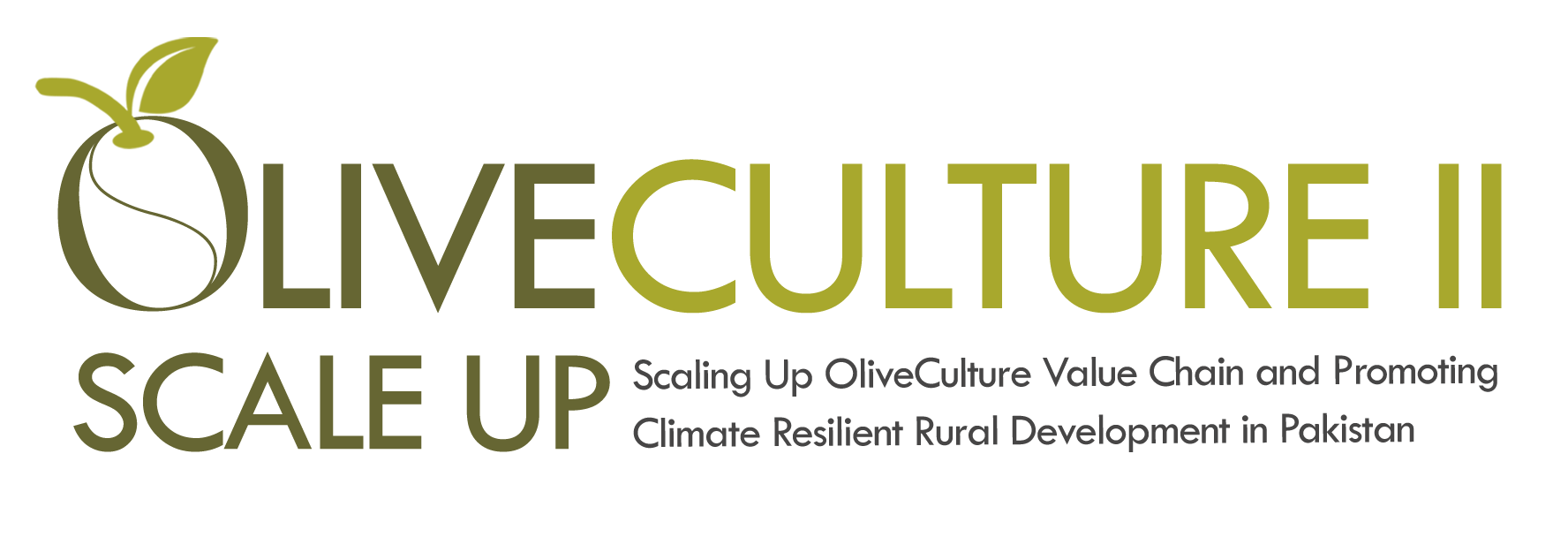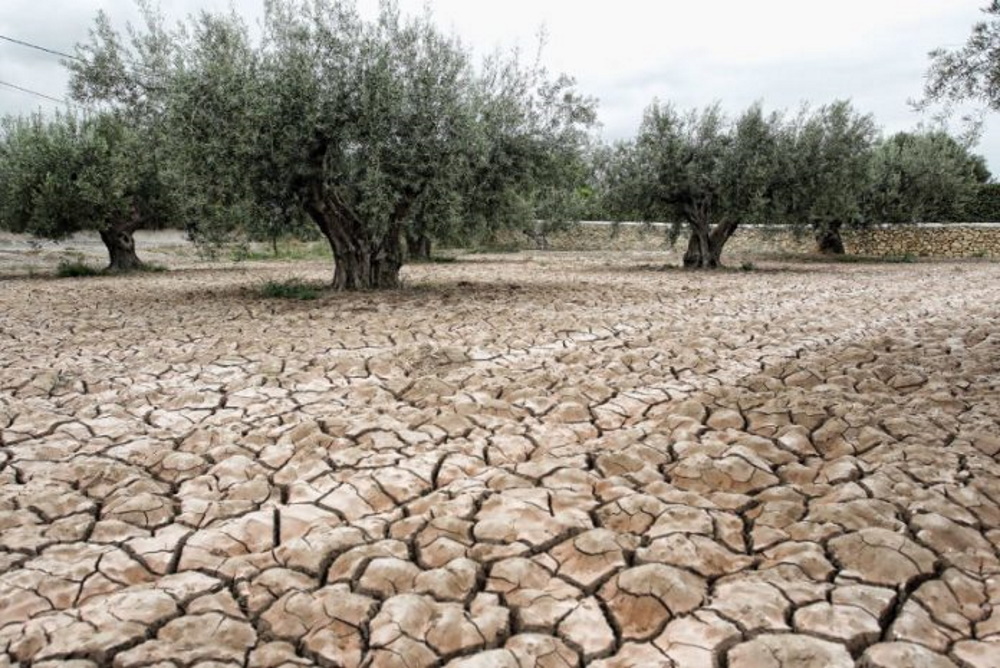Climate change refers to long-term shifts in weather patterns and average temperatures on Earth. It is primarily driven by human activities, particularly the burning of fossil fuels (such as coal, oil, and natural gas), deforestation, and industrial processes, which release large amounts of greenhouse gases (GHGs) into the atmosphere. These GHGs, including carbon dioxide (CO2), methane (CH4), and nitrous oxide (N2O), trap heat in the Earth’s atmosphere, leading to a phenomenon known as the greenhouse effect Olive oil is an important table food in many households worldwide, and its production can be seen as an important economic indicator in Mediterranean region such as Spain. However, the impact of climate change on olive oil production cannot be ignored.
The OliveCulture project in Pakistan, funded by the Italian government, aims to train the farmers for mitigation of climate change impacts and promote sustainable and good agronomic olive farming practices. Let’s explore the vision of the OliveCulture Project and the ways in which it mitigates the impacts of climate change on olive farming in Pakistan.
Mitigating Climate Change Impacts
Climate change has a significant impact on olive farming. Back in 2022, due to torrential rain and other climatic factor, in the province of Baluchistan and KP, lead to reduced yields and poor-quality olives due to high flooding. Addressing climate change requires a multi-faceted approach that involves mitigation and adaptation strategies. Mitigation focuses on reducing greenhouse gas emissions through transitioning to renewable energy sources, improving energy efficiency, promoting sustainable land use practices, and adopting cleaner technologies. The OliveCulture project aims to mitigate these impacts through the technical promotion of sustainable farming practices that conserve natural resources and reduce greenhouse gas emissions. By implementing good farming practices, such as efficient irrigation systems and soil management techniques, the project aims to minimize the adverse effects of climate change on olive oil production.
Environmental Impact: More Efficient Carbon Sink:
According to the 2017 study of the CO2 balance of olive oil in the world carried out by the International Olive Council (IOC), the world olive-growing area, which spans 10.5 million hectares according to IOC data, is capable of capturing 47 million tons of CO2 per year. This means that, on average, one hectare of olive grove can capture 4.5 tons of CO2 per year. Taking into account the total life cycle of olive oil, it can be maintained that the production of one kilogram of olive oil removes 10 kg of CO2 from the atmosphere. By implementing sustainable and climate-friendly practices in agriculture, such as precision farming, agroforestry, or regenerative agriculture, farmers can effectively sequester carbon or reduce their emissions.
Olive orchards have the potential to act as a carbon sink, meaning they can absorb and stored carbon dioxide (CO2) from the atmosphere. The OliveCulture Project emphasizes sustainable olive oil production practices that promote the sequestration of CO2 in the soil and it can save the eco system. By enhancing the carbon sink capacity of olive orchards, OliveCulture project aims to promote sustainable and good agronomic practices that enhance the carbon sequestration potential of olive trees. By doing so, olive farmers can contribute to the conservation of the environment and reduce the impact of climate change.
Lessons the Risk of Soil Erosion and Desertification and Stops Land Degradation:
Soil erosion and desertification are significant challenges facing olive farming in Pakistan. These challenges are exacerbated by climate change, which leads to soil degradation and reduced soil fertility. Through the OliveCulture expert’s technical assistance to the farmers, it focuses on implementing soil conservation measures, such as terracing and contour plowing, to prevent soil erosion and maintain soil fertility. By adopting sustainable land management practices, the project also aims to safeguard the land from degradation and preserve its productivity. With the technical assistance provided by OliveCulture experts from CIHEAM Bari, farmers can reduce the risk of soil erosion and desertification, improve soil fertility, and increase yields.
Conserves the Natural Habitat for Wildlife:
The OliveCulture Project recognizes the importance of conserving the natural habitat within olive farms. Olive groves provide a natural habitat for many species of wildlife, including birds, insects, and mammals. These habitats are under threat due to climate change and unsustainable farming practices. By promoting biodiversity-friendly practices, such as maintaining hedgerows and planting native vegetation, the project aims to support the ecological balance and preserve the natural habitat for wildlife.
Source and Conservation of Organic Matter:
Organic matter is essential for soil fertility and plant growth. However, unsustainable farming practices can lead to the depletion of organic matter in the soil. Organic matter plays a crucial role in soil health and fertility. By implementing practices such as composting, cover cropping, and organic fertilization, The OliveCulture project also focuses to enhance soil organic matter content by providing technical assistance to the farmers through Italian experts on Good Agronomic Practices, HACCP, Organic matter technology, Integrated Pest Management Techniques and production of nursery material. This not only improves soil structure and nutrient availability but also contributes to climate change mitigation by sequestering carbon in the soil.
Natural Vegetation Cover:
Natural vegetation cover is essential for soil conservation, water retention, and biodiversity conservation. However, untenable farming practices can lead to the destruction of natural vegetation cover. OliveCulture Project promotes the preservation of natural vegetation in and around olive groves. This includes preserving native plant species, establishing buffer zones, and implementing agroforestry practices and intercropping. By maintaining natural vegetation cover, the project helps regulate microclimates, conserve water resources, and enhance biodiversity.
Reduces the Adverse Effect at Micro Climate Region:
Climate change has a significant impact on microclimate regions, which can lead to reduced yields and poor-quality olives. To promote agroecological farming practices that reduce the adverse effects of climate change on microclimate regions. By doing so, farmers can improve yields, increase the quality of olives, and promote sustainable development.
In conclusion:
The effective mitigation of climate change within olive groves can be achieved through the implementation of sustainable agricultural practices. Precision irrigation, integrated pest management, and the adoption of organic farming methods are integral components of these efforts. By embracing such practices, the reduction of greenhouse gas emissions and the minimization of chemical inputs are realized, contributing to the preservation of ecosystem health. Moreover, these sustainable practices yield benefits such as enhanced soil fertility and the conservation of precious water resources.
In the larger context of combating climate change, the significance of olive groves becomes more pronounced when coupled with thoughtful land management strategies and robust policy support. Encouraging the widespread adoption of climate-smart practices in olive cultivation emerges as a pivotal step. This can be facilitated by fostering an environment of research and innovation in the field. Furthermore, integrating olive groves into comprehensive climate change adaptation and mitigation strategies serves as a means to amplify their positive impact on the global climate crisis.
The OliveCulture Project in Pakistan is dedicated to promoting sustainable olive oil farming practices in the face of climate change. By mitigating climate change impacts, conserving the natural environment, and implementing climate-smart agricultural techniques, the project aims to ensure the long-term viability and resilience of olive farming in Pakistan. Through its vision and initiatives, the OliveCulture Project contributes to both environmentally intensive farming and the socioeconomic development of the olive oil sector in the country.

